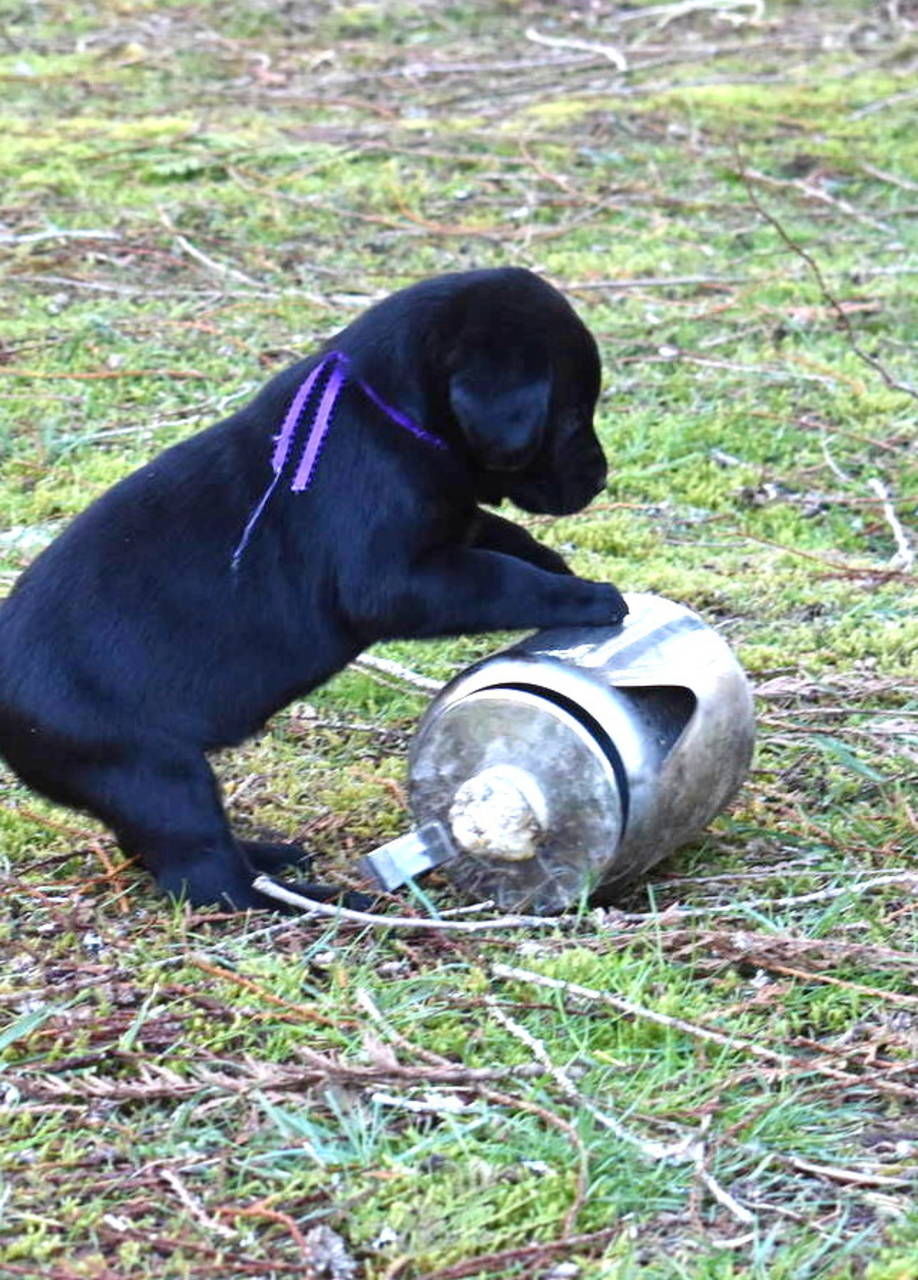HOW YOUR PUPPY IS RAISED
Our Labrador puppies are raised in our puppy barn. We keep a close eye on each litter and monitor their growth daily. Our interactions with these puppies begins at birth. We begin the Early Neurological Stimulation program (ENS) when the puppies are 3 days old thru 16 days old, a period believed to be a time of rapid neurological growth and development. This program includes five different handling exercises, once a day, aimed to improve cardiovascular performance (heart rate), stronger heart beats, stronger adrenal glands, more tolerance to stress and greater resistance to disease.
Once the puppies are old enough, we begin to introduce smells, sounds and sights. Toys and items in the puppy barn and yard are rotated at least weekly, if not more often, in an effort to introduce them to new items. Nail trims, ear cleaning and exposure to grooming are all done weekly. Our hope is that through exposure and handling, your puppy will be confident and ready to explore their new world as soon as they go home with you.
At around 4-5 weeks of age, we begin to see individual personalities emerging. The puppies temperament, drive, reactions and sociability are noted. By six weeks of age, the mother has weaned the litter and they are eating solid foods. The puppies are also microchipped at six weeks of age. We deworm the litter at 2, 4, 6 and 8 weeks of age. At 7 weeks of age the puppies begin the first in a series of core vaccines.
We are always available for any questions that may arise after taking your puppy home. We provide breeder support for life and hope to be updated periodically on your puppy's progress.

1 WEEK OLD
01
WEEK
Puppies should have doubled their birth weight by now but are still blind, deaf, and unable to control their body temperature. We monitor their weight gain and room temperature closely at this stage. They rely entirely on their mother and spend most of their time sleeping.

2 WEEKS OLD
02
WEEKS
The puppies eyes and ears are beginning to open and they are starting to crawl around. We now begin slowly introducing the puppies to new sounds and stimuli. Puppies are handled several times daily to get them used to humans.

3 WEEKS OLD
03
WEEKS
The development of the puppy's senses is rapid this week and alertness increases. They begin to recognize familiar people and become aware of their environment. The puppies are exploring outside of the whelping box and are introduced to semi-solid food. The puppies are developing bowel control and potty training basics.

4 WEEKS OLD
04
WEEKS
The puppies are exploring their surroundings an increasing amount and the litter now has access to indoor and outdoor areas at all times. We make a point to frequently expose them to new situations, sounds and smells. A basic personality test is conducted to help determine energy level and properly match puppies with new families.

5 WEEKS OLD
05
WEEKS
Independence is increasing and the importance of interactions with humans emerges. The puppies are included in our daily lives and are becoming accustomed with the sights, sounds and smells of a human home. Each puppy is routinely socialized with other animals and visitors as a part of this learning process.

6 WEEKS OLD
06
WEEKS
The puppy's individual personalities are now apparent and they are increasingly active. Under the mother's guidance, the litter begins to understand discipline and manners. The puppies become familiar with new scenarios as we continue to socialize them to any new experience, sound or object we can think of.

7 WEEKS OLD
07
WEEKS
Although decreasingly reliant on their mother for sustenance, the puppies are still learning a tremendous amount about how to be a dog from her. Socializing with littermates is extremely important. Puppies become used to touch and stimulation through playing with their littermates and humans.

8 WEEKS OLD
08
WEEKS
Puppies are fully weaned and ready to begin life away from their littermates. The critical socialization period that began at five weeks old continues through 12-16 weeks of age. A puppy's personality imprints during this period and it is important that the puppy continue to experience new circumstances.
